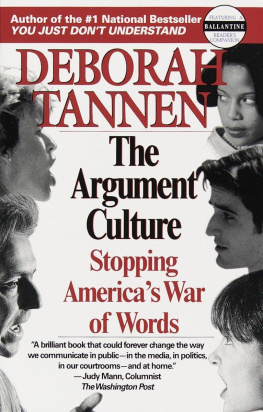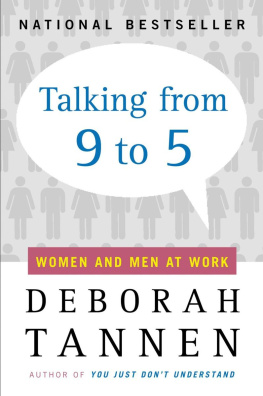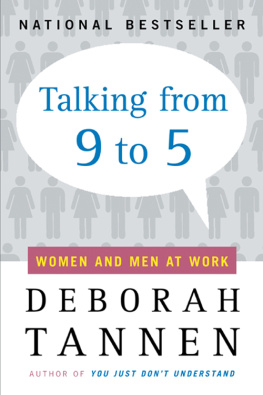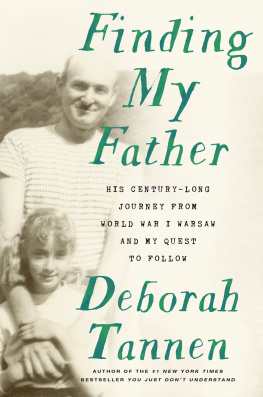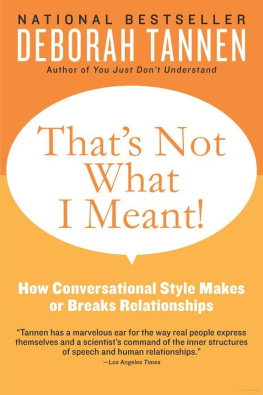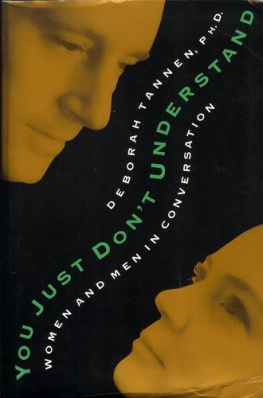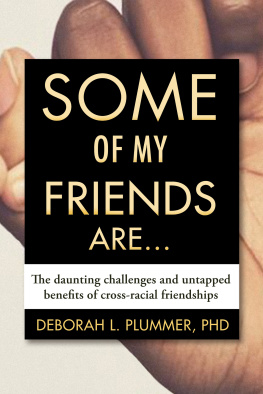Deborah Tannen - Youre the Only One I Can Tell: Inside the Language of Womens Friendships
Here you can read online Deborah Tannen - Youre the Only One I Can Tell: Inside the Language of Womens Friendships full text of the book (entire story) in english for free. Download pdf and epub, get meaning, cover and reviews about this ebook. year: 2017, publisher: Random House Publishing Group, genre: Science fiction. Description of the work, (preface) as well as reviews are available. Best literature library LitArk.com created for fans of good reading and offers a wide selection of genres:
Romance novel
Science fiction
Adventure
Detective
Science
History
Home and family
Prose
Art
Politics
Computer
Non-fiction
Religion
Business
Children
Humor
Choose a favorite category and find really read worthwhile books. Enjoy immersion in the world of imagination, feel the emotions of the characters or learn something new for yourself, make an fascinating discovery.

- Book:Youre the Only One I Can Tell: Inside the Language of Womens Friendships
- Author:
- Publisher:Random House Publishing Group
- Genre:
- Year:2017
- Rating:5 / 5
- Favourites:Add to favourites
- Your mark:
- 100
- 1
- 2
- 3
- 4
- 5
Youre the Only One I Can Tell: Inside the Language of Womens Friendships: summary, description and annotation
We offer to read an annotation, description, summary or preface (depends on what the author of the book "Youre the Only One I Can Tell: Inside the Language of Womens Friendships" wrote himself). If you haven't found the necessary information about the book — write in the comments, we will try to find it.
Youre the Only One I Can Tell: Inside the Language of Womens Friendships — read online for free the complete book (whole text) full work
Below is the text of the book, divided by pages. System saving the place of the last page read, allows you to conveniently read the book "Youre the Only One I Can Tell: Inside the Language of Womens Friendships" online for free, without having to search again every time where you left off. Put a bookmark, and you can go to the page where you finished reading at any time.
Font size:
Interval:
Bookmark:
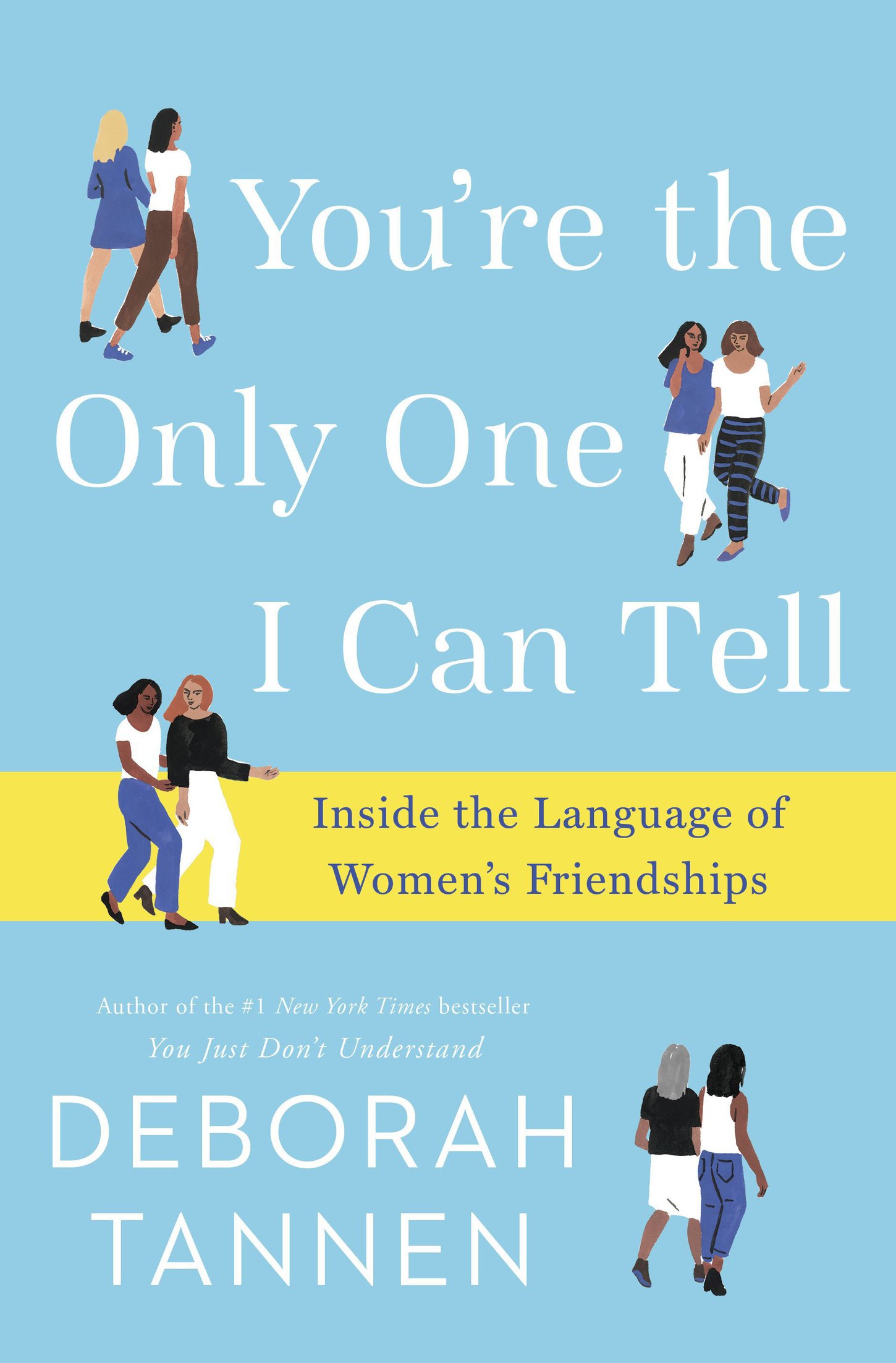
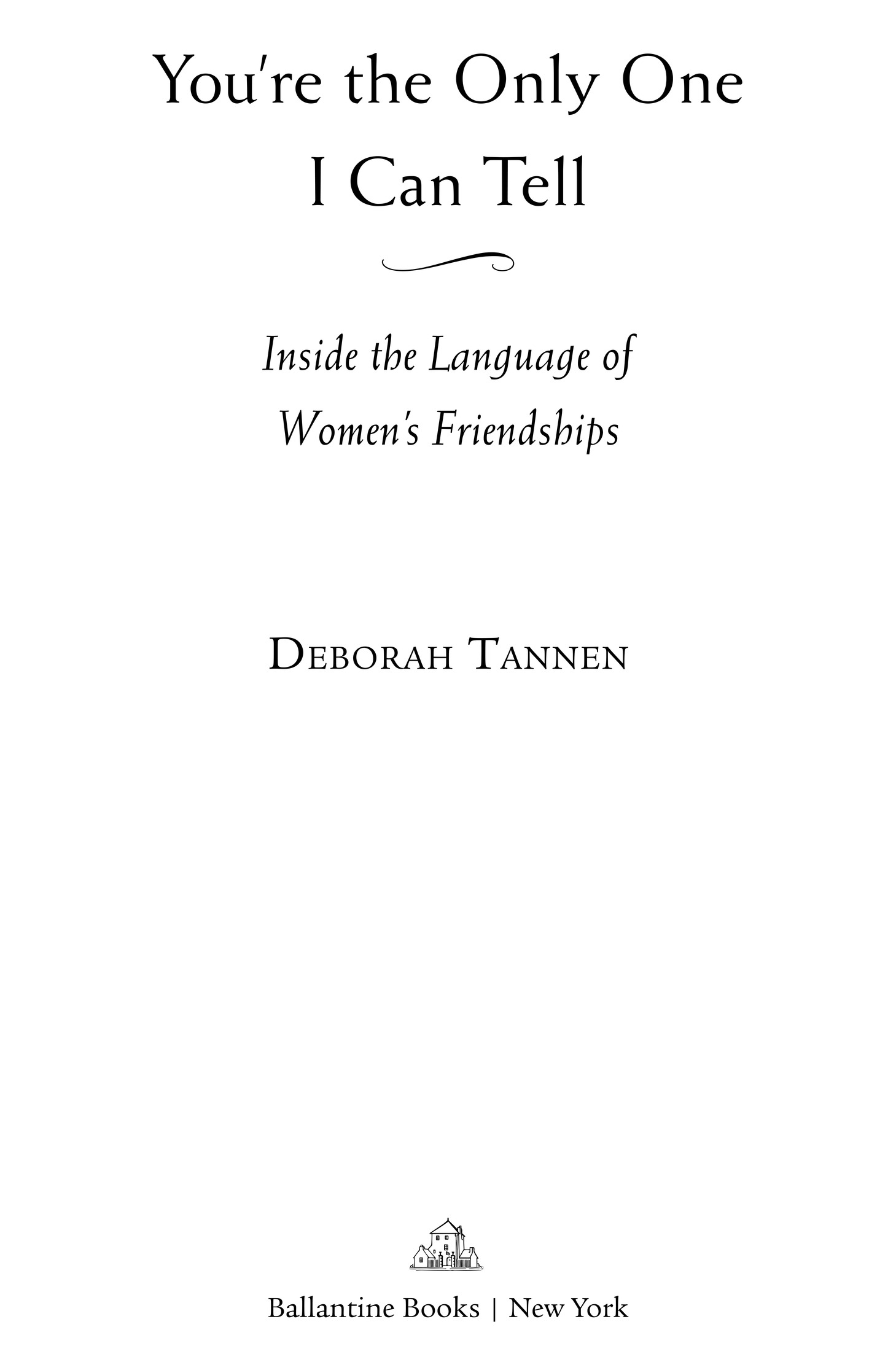

Copyright 2017 by Deborah Tannen
All rights reserved.
Published in the United States by Ballantine Books, an imprint of Random House, a division of Penguin Random House LLC, New York.
B ALLANTINE and the H OUSE colophon are registered trademarks of Penguin Random House LLC.
Hardback ISBN9781101885802
Ebook ISBN9781101885819
randomhousebooks.com
Book design by Virginia Norey, adapted for ebook
Cover design: Caroline Teagle Johnson
Cover illustrations: Leah Goren
v4.1
ep
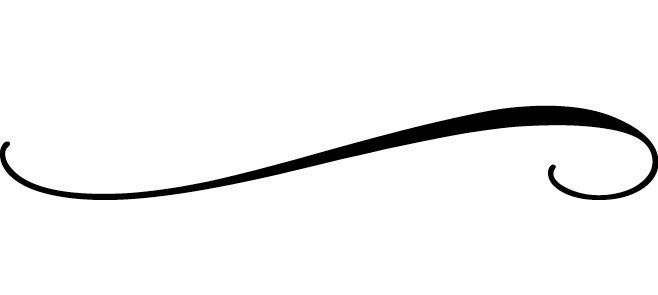

Best friend, old friend, good friend, close friend, good strong friend, bestie bestie, go-to core friend, close close friend, very very very very close friend, bff, my sweet angel from heaven: as I interviewed over eighty women about their friendships, and spoke casually about the topic with dozens more, I heard a seemingly limitless range of words and phrases that women used when referring toand thinking aboutthe women friends they cherish. And explanations of why they cherish them were equally vastand inspiring: Women friends are the people you turn to emotionally. They are the most sustaining thing in my life; Ive been protected and defended and shielded by my women friends; My friendships with women are as essential as air; My women friends are my life.
But I also heard comments like, With women, throughout my life, the hardest part is getting to be friends at all. Once we cross the line and become friends, its great, but it hasnt happened often; I find female friendships a difficult terrain to negotiate, to navigate; I dont have women friends. I dont trust women. Though those who described more negative than positive experiences were in the minority, nearly everyone I spoke to mentioned ways that friends could frustrate or annoy, and told tales of heartache suffered when close friends disappointed or disappeared. Like all significant relationships, friendships among women can be the source of great solace but also of puzzlement and pain.
Conversations among women friends have much in common with the topics of my two previous books: You Were Always Moms Favorite!: Sisters in Conversation Throughout Their Lives, and Youre Wearing THAT?: Understanding Mothers and Daughters in Conversation. A journalist interviewing me about mothers and daughters once blurted, Why are these relationships so fraught? After all, were both women! She was thinking of my book You Just Dont Understand, where I traced many conversational frustrations to differences in womens and mens ways of speaking. I had to think about that question for a moment. Then the answer seemed obvious: its because were both women. As I explained in that early book, girls and women, as compared to boys and men, tend to talk moremore often and at greater lengthand to talk about more personal topics. All this talk can lead to more intimacy and closeness but also affords more opportunities to stir up emotionsboth comforting and troublingand to say the wrong thing.
Another way that womens friendships resemble relationships between daughters and mothers and among sisters is the source of hurt feelings. Just as with those family relationshipsand in contrast to relationships among sons, fathers, and brotherswhen women told me about being upset by friends, it was often because they hadnt been included in something or hadnt been told something. This reflects the sensitivity, common among women, to feeling left out or pushed away. (Mens sensitivities tend to lie elsewhere: to feeling put down or pushed around.)
In other ways, though, friendship is different from the family relationships Ive written about. One big difference is the challenge of simply identifying who is a friend. When I asked women about their mothers, daughters, and sisters, they immediately knew who those were, and the number was limited. (Surprises in that regardlearning that you have siblings you didnt know about, or that the person you thought was your mother or sister really isntare the stuff of novels and life-changing personal drama, even trauma.) But when I asked about friends, I heard of a dizzying array of relationships. Women spoke of friends they see or speak to every day, and of friends they havent seen or spoken to in years but still feel close to; they told me about friends theyve known their whole lives, friends they met recently, and friends theyve never met but have become close to through social media. And many women I interviewed, at one point or another, suddenly thought of someone they had forgotten but realized they should tell me about. A womans concept of what constitutes friendship could vary within a single interview. One described a couples friend she values, but later in our conversation, she said that she didnt really have or need friends because she had her husband and the couples they see socially. In her first comment, the woman she sees as part of a couple is a type of friend, but in the second, friend seems reserved for someone she sees separately, one on one.
Despite how different the relationships with those called friends could be, hearing about them always gave me a window into a womans world at the time of the friendship. For many, having friends was synonymous with having a good life. That was certainly true for my mother. Explaining why the period between getting married and having her first child was the happiest of her life, she said, We went out; we had friends. When I asked about her childhood in Russia, she said she didnt remember much, but she was happy because she had friends. And it was clear, from her words and also from her life, that not having friends meant not being happy. Each time she had to movefrom the house where she and my father had raised their children to a rented apartment, and later from the rental to a suburban condoshe was deeply unhappy until she succeeded in making new friends. In their eighties, my parents moved to a senior residence. Whenever I spoke to my mother in the months after that move, shed end the conversation by saying, I still dont have a friend. And if I asked about a social worker my sisters and I had hired to help her adjust, shed say, I wish she could find me a friend or, more bleakly, She cant find me a friend.
As I interviewed women for this book, I realized that my mother was not unusual. An octogenarian commented, when she heard that someone died, I wish it had been me because my friends are gone. And a woman who told me that her mother, who was born in England, never adjusted to life in the United States, backed up that observation by saying that her mother never made friends here; she kept her friends in England and lived for the times when she could go back and see them.
Some women said they liked having lots of friends, and some said they needed only a few, but almost no one said she didnt want any. Those who told me they didnt have women friends always said it with regret. One woman articulated what many others implied: after her husband died, she went ahead and built the house they had planned to build together, and she lived in it for two years, but then she sold it and moved. It did not make me happy, she said. It was a perfect house, but it was just a house. I learned a very valuable lesson, that its all stuff except people and relationships. That means relationships with family and also with friends.
Font size:
Interval:
Bookmark:
Similar books «Youre the Only One I Can Tell: Inside the Language of Womens Friendships»
Look at similar books to Youre the Only One I Can Tell: Inside the Language of Womens Friendships. We have selected literature similar in name and meaning in the hope of providing readers with more options to find new, interesting, not yet read works.
Discussion, reviews of the book Youre the Only One I Can Tell: Inside the Language of Womens Friendships and just readers' own opinions. Leave your comments, write what you think about the work, its meaning or the main characters. Specify what exactly you liked and what you didn't like, and why you think so.

